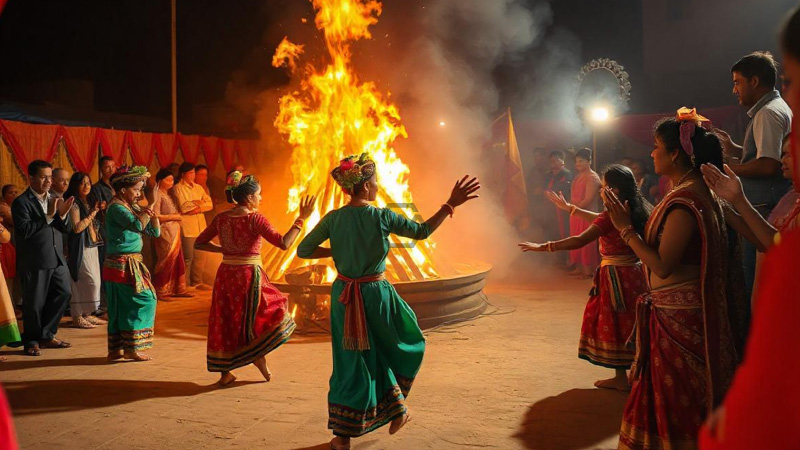- Date: Celebrated on January 14, 2025, marking the end of the harvest season.
- Significance: A festival of gratitude, abundance, and cultural unity in Assam.
- Rituals: Includes bonfires, feasts, and traditional games like buffalo fights.
Magh Bihu, also known as Bhogali Bihu, is one of Assam’s most cherished festivals, signifying the end of the harvest season. Farmers rejoice in the fruits of their labor, celebrating with grand feasts and traditional customs.
On the eve of Magh Bihu, known as Uruka, communities come together to cook, sing, and dance around makeshift huts and bonfires, creating a joyous and united atmosphere.
Bhogali Bihu 2025: A Feast of Togetherness
This festival is not only about the harvest but also highlights Assam’s rich cultural heritage. Traditional Assamese dishes such as pithas and larus are prepared, reflecting the state’s culinary diversity. Rituals like lighting the Meji bonfire and offering prayers to Agni signify a spiritual connection with nature, reinforcing gratitude for prosperity.
One of the most captivating aspects of Magh Bihu is the tradition of building a Bhelaghar, a temporary shelter where feasts are enjoyed. This practice underscores the values of sharing and community bonding. The night before Magh Bihu, known as Uruka, sets the stage for celebrations filled with laughter, music, and traditional food.
Rituals performed during Magh Bihu reflect the community’s respect for nature and agriculture. The lighting of the Meji bonfire is a central act where people offer prayers to the fire god for blessings and protection. The flames of the Meji symbolize warmth, unity, and prosperity.
Sports and games further enhance the festive spirit of Magh Bihu. Buffalo fights, tekeli bhonga (pot-breaking), and other traditional activities bring energy and excitement, especially in rural Assam. These traditions bridge generations, keeping the cultural essence of the festival alive.
Magh Bihu embodies the spirit of gratitude, togetherness, and joy, serving as a reminder of Assam’s cultural richness and the enduring bond between nature and community.
“Gratitude turns what we have into enough.” Magh Bihu reflects this sentiment perfectly, celebrating the harvest season with appreciation, unity, and abundance.



